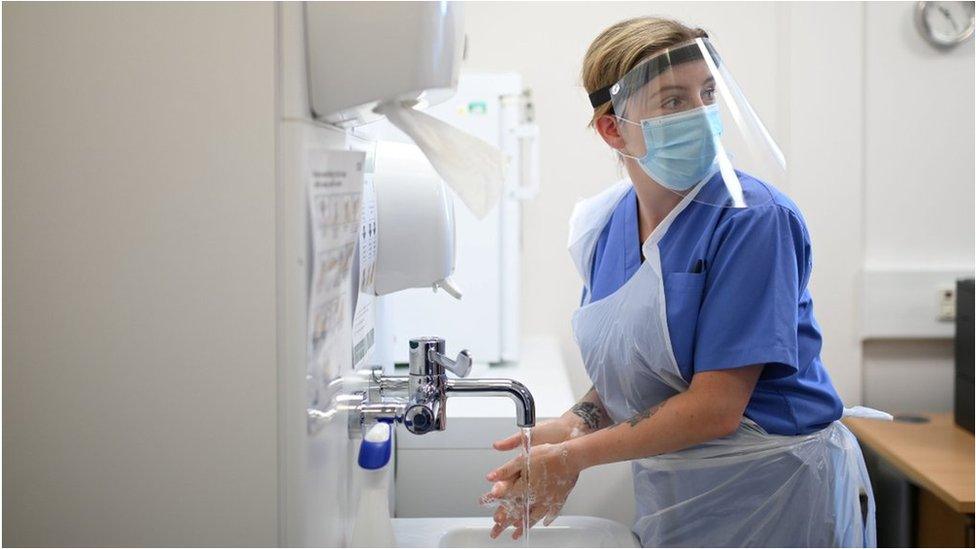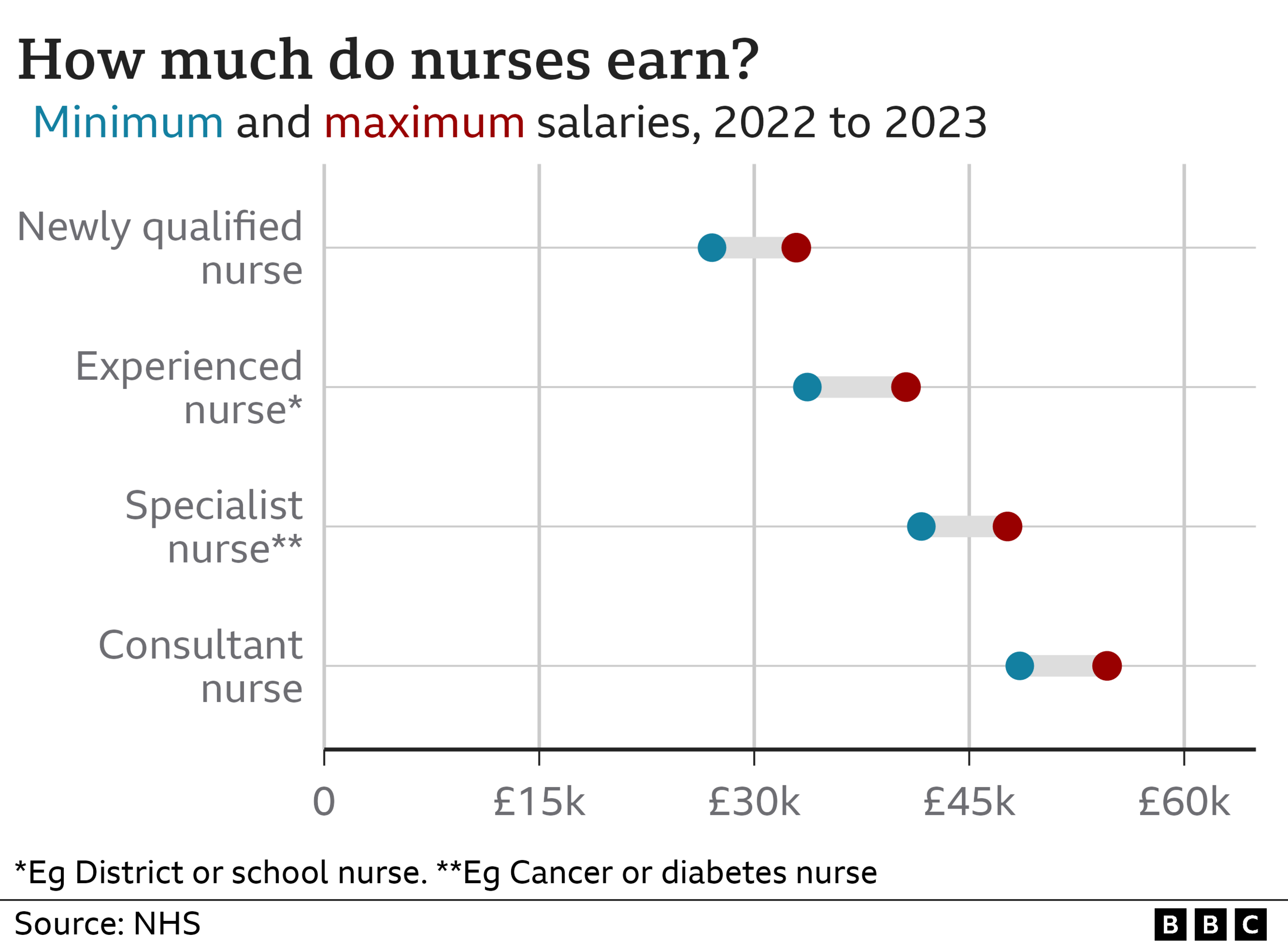Does the average nurse earn £34,000 a year?
- Published

Nurses in England, Wales and Northern Ireland have held more strike action over pay.
The Royal College of Nursing (RCN) - which represents two-thirds of UK nurses - says its members have been getting a "raw deal" on pay for years.
But Education Secretary Gillian Keegan told Sky News on 9 November: "I think the average when I last looked was £34,000 before these increases, so it's more than the average salary across the country."
What is average pay for nurses?
The £34,000 figure is used in the report from the NHS Pay Review Body, external, which recommends what should happen to NHS pay in England.
In the category "nurses and health visitors", the average basic pay per full-time employee was given as £34,275, but that is a figure for March 2021.
The government says, external that figure increased to £35,600 by March 2022, and that nurses were then given a £1,400 increase, which should take the average up to £37,000.
Is that above the average salary?
That depends on which average you're talking about.
The mean UK full-time salary, which is what you get if you add up the amount all full-time employees are paid and divide by the number of full-time employees, is £39,966, according to the figures, external for April 2022 from the Office for National Statistics (ONS).
But from the same report, the median, which is the amount that half of full time employees will be earning more than, and half will be earning less than, is £33,000.
So the average figure for nurses is higher than the median salary but lower than the mean.

How does it vary between grades?
The most common grade for NHS nurses is Band 5, which accounts for about 42% of nurses in England.
That's the pay grade for newly qualified nurses as well as some more experienced ones. Their salaries range, external between £27,055 and £32,934.
Band 6 is more senior nurses and specialists and their basic pay is between £33,706 and £40,588.

Band 7 includes advanced nurse practitioners, earning between £41,659 and £47,672.
Band 8 is divided into four sections, including modern matrons and heads of nursing teams, who can earn between £48,526 and £91,787.
There are also 306 nurses in Band 9, who are consultant level nurses and can earn between £95,135 and £109,475.
How does it vary across the UK?
The RCN told us:
The starting salary of a nurse in NHS Scotland is £26,104. An experienced nurse at the top of Band 5 earns about £33,000.
In Wales, a band 5 nurse earns between £27,055 and £32,934.
In Northern Ireland, it's last year's pay scales as the award this year hasn't been implemented due to the political situation. The top of band 5 earns around £31,534.
Nurses in Scotland were made a fresh pay offer averaging 7.5%, which was accepted by Unite and Unison but rejected by the RCN, GMB and the Royal College of Midwives.
Health Secretary Steve Barclay was talking about the deal offered by the Scottish government on BBC News on 21 December and said: "That wasn't just for an uplift of 7.5%, it was actually an uplift much closer to around 20% when you add in additional measures of reduced hours, changes to overtime, protected learning and other things that were within the package."
Reality Check asked his department how he had worked out the 20%, but the response did not give any indications of that.
We know that the offer included, external a review into reducing the working week to 36 hours from 37.5, which would be about another 4%.
There were also undertakings about reviewing job descriptions for band 5 roles and ensuring protected learning time, but it is not clear how that would make the package worth close to 20%.
Can nurses earn extra on top of that?
Staff in pay bands one to seven are eligible for overtime payments, which is 1.5 times the hourly rate or twice the hourly rate for working on bank holidays.
They can also get allowances for working in London and surrounding counties and for being on call.
NHS staff across the UK have access to pension schemes, which have become less generous in recent years, but are still of a type that has historically been better than what is available in the private sector.
Has nurses' pay kept up with inflation?
Nurses' pay has not kept up with rising prices since 2010. They have had a real terms pay cut of more than 10%.
It has also failed to keep up with average earnings, either in the private sector or the public sector, as the Institute for Fiscal Studies has confirmed.
Allow X content?
This article contains content provided by X. We ask for your permission before anything is loaded, as they may be using cookies and other technologies. You may want to read X’s cookie policy, external and privacy policy, external before accepting. To view this content choose ‘accept and continue’.
How does pay compare with Europe?
The RCN's General Secretary Pat Cullen told the BBC on 11 December: "International evidence brought out by the OECD last week shows, and this is despicable, that UK nurses are paid the lowest in Europe."
But that claim is not supported by the OECD's Health at a Glance, external report, which was published on 5 December (see page 187).
UK nurses did not come out as the worst paid, with French nurses, for example, coming out lower on both measures used.
Watch this video quiz to test your knowledge of nurses' pay
Correction: An earlier version of this story incorrectly referred to Gillian Keegan as the health secretary.


